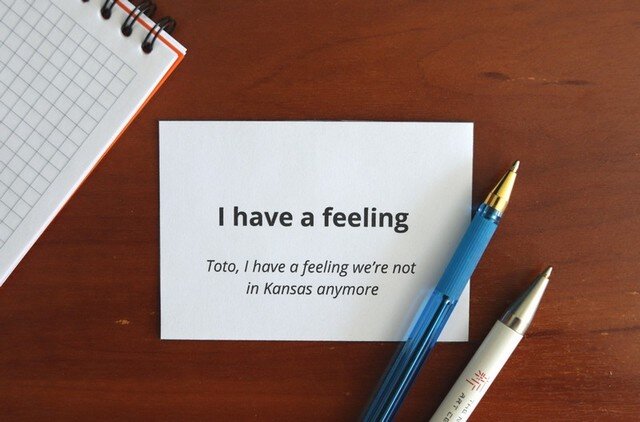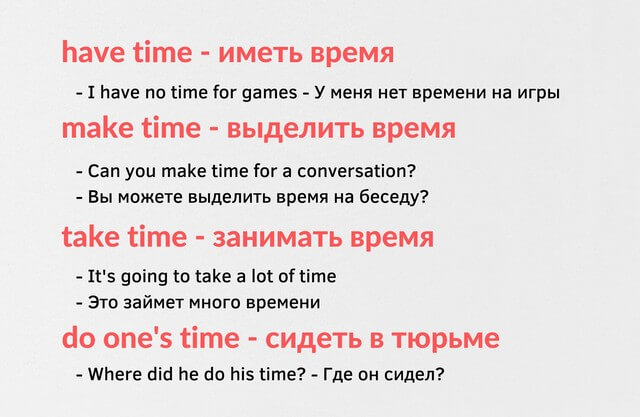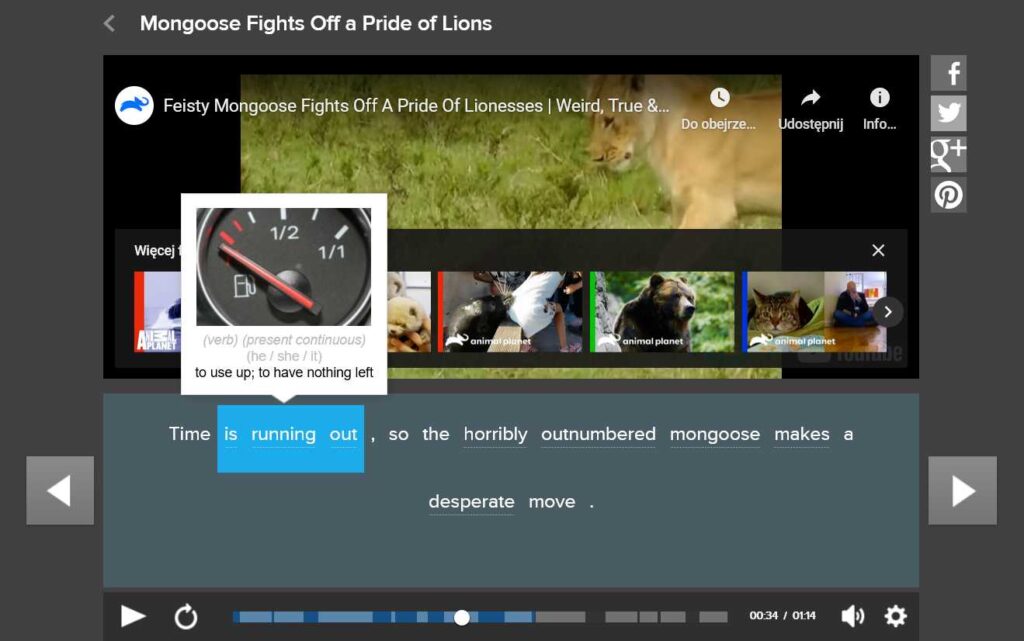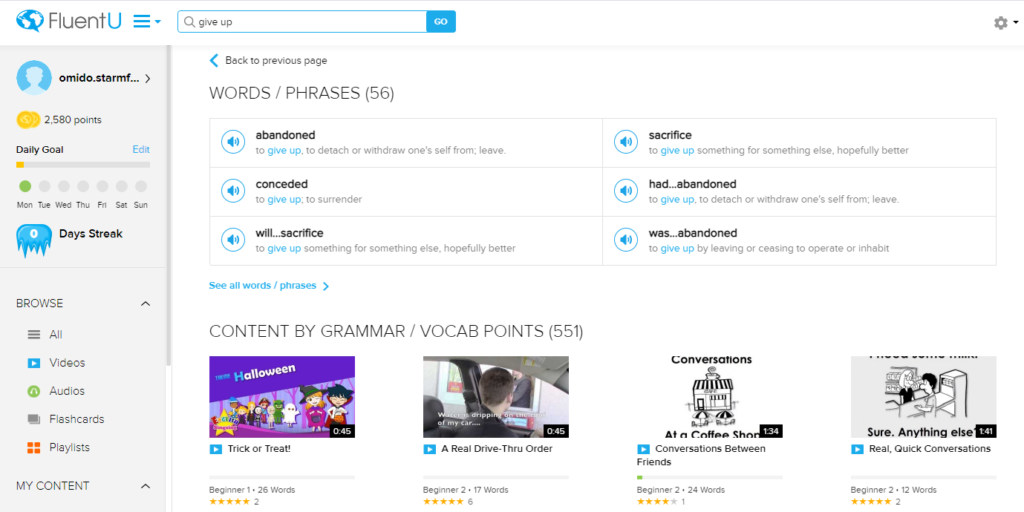Разговорный английский включает в себя много речевых клише — фраз, используемых как готовые формулы для частых ситуаций. Это могут быть выражения из одного слова (hello) или из нескольких (to tell you the truth). В этой подборке приведены разговорные фразы на английском языке, которые пригодятся в повседневной речи.
Речевые шаблоны — важная часть разговорного английского
Под разговорным английским можно подразумевать неофициальный стиль речи, с помощью которого общаются между собой носители языка. Он пестрит идиомами, сленгом, цитатами из бородатых анекдотов и шуток с местного ТВ. Чтобы полноценно участвовать в общении, к примеру, американцев, желательно пожить в США.
Но чаще разговорным английским называют сугубо функциональный инглиш, когда требуется объяснить, что деталь А вставляется в деталь Б, а не наоборот. Здесь главное знать минимум лексики и грамматики, иметь достаточно практики, а все остальное — необязательная роскошь.
К этому минимуму относятся и разговорные фразы на английском языке. Эти фразы-клише, фразы-заготовки способны сами по себе решить львиную долю коммуникативных задач. К примеру, полностью клишированы такие повседневные детали общения, как приветствие и прощание, пожелание хорошего дня, выражение благодарности и извинение.
Вставляя нужные заготовки, вы придаете высказыванию оттенок уверенности или неуверенности, радостного или недовольного отношения к событию. Словом, разговорные фразы-шаблоны — это очень удобно.
Словарные карточки для распечатки
Ниже я привожу полезные выражения в виде списка с переводом и примерами. Однако, если вы хотите действительно хорошо и быстро их запомнить, я рекомендую выучить их с помощью карточек.
Я сделал набор из 154 карточек для распечатки с выражениями, примерами, переводом. Если хотите выучить эти фразы быстро и надежно, обязательно воспользуйтесь этими карточками!
Приветствия и прощания
Формулы приветствий включают не только само приветствие, но и следующий за ним вопрос вроде «Как дела?», «Как жизнь?» и т. д. Начнем с приветствий и прощаний:
| Hello | Привет, здравствуйте |
| Hi | Привет |
| Good morning | Доброе утро |
| Good afternoon | Добрый день |
| Good evening | Добрый вечер |
| Good bye (Bye) | Пока |
| See you later (see you) | До скорого |
| Have a nice (good) day | Хорошего дня |
Примечания:
- Hello и Good bye — наиболее нейтральные формы приветствия и прощания, которые подойдут для любой ситуации. Hi — более разговорная, дружеская форма.
- Для приветствия используются фразы good morning afternoon evening, но не good night — это пожелание спокойной ночи.
- В английском, как и в русском, есть прощальные слова, которые подразумевают расставание навсегда, например farewell (прощай) — это слово с книжным оттенком встречается скорее в исторических фильмах, а не повседневной речи.
За приветствием обычно следует формальный вопрос типа «Как дела?» Вот основные варианты вопроса и ответа:
| How are you? | Как ты? Как дела? |
| How are you doing? | Как дела? |
| How is it going? | Как поживаешь? |
| Fine | Отлично |
| Good | Хорошо |
| I’m ok | Нормально |
| How about you? | А как у тебя дела? |
| And you? | А у тебя? |
Примечания:
- Перед fine, good или ok следует добавить thanks или thank you, поблагодарив собеседника за то, что он интересуется, как у вас дела: Thanks, I’m fine.
- Вопрос «How are you?» — это просто приветствие, формула вежливости. Не стоит рассказывать в подробностях, как у вас дела или, еще хуже, жаловаться на жизнь.
- Более подробно о тонкостях приветствий читайте в статье: Как отвечать на приветствия на английском языке?
Выражение благодарности и ответ
В 99% случаев для выражения благодарности и ответа на него подойдут слова: «Thank you.» — «You are welcome.» Эта формула в точности соответствует русскому «спасибо — пожалуйста». Но есть и другие варианты. Вот несколько популярных формул выражения благодарности:
| Thank you Thanks | Спасибо |
| Thank you very much | Спасибо большое |
| Thanks a lot | Спасибо большое огромное |
| Thank you so much | Большое вам спасибо |
| Cheers (informal) | Спасибо (неформально) |
| I appreciate it | Я ценю это (ценю вашу помощь) |
| You’re welcome | Пожалуйста |
И ответы на благодарность:
| Always welcome | Всегда пожалуйста |
| That’s all right | Не стоит |
| Don’t mention it | Не за что |
| Not at all | Не за что |
| It’s nothing | Не за что Пустяки |
| No problem (informal) | Без проблем (неформально) |
Извинения и ответы на извинения
| Sorry | Извините |
| Excuse me | Простите |
| I’m so sorry! | Мне так жаль! |
| It’s ok! | Все в порядке! (Да ничего) |
| No problem! | Без проблем! |
| It’s fine | Все отлично |
Примечания:
- Если коротко, то разница между sorry и excuse me в том, что sorry говорят уже после того, как что-то натворят (наступил на ногу — Oh, sorry!), а excuse me — когда только собираются (Excuse me, can I take your pen, please?). То есть sorry — это когда выражают сожаление о чем-то, а excuse me — чтобы привлечь внимание, обратиться, о чем-то попросить.
- В ответ на sorry обычно говорят ok, it’s fine, no problem, примерно как мы отвечаем «да ладно!» или «ничего страшного».
Выражение уверенности и неуверенности
В разговоре часто употребляются слова, указывающие на уверенность или неуверенность говорящего.
| Выражение уверенности | |
|---|---|
| I’m sure | Я уверен |
| I’m pretty sure | Я вполне уверен |
| I’m absolutely sure | Я совершенно уверен |
| I’m certain | Я уверен убежден |
| I’m positive | Я уверен точно знаю |
| No doubt | Без сомнений |
| I bet | Готов поспорить |
Примечания:
- Выражения I’m (pretty, absolutely) sure подойдут для любой ситуации. I’m certain I’m positive выражают несколько большую уверенность, чем I’m sure, и звучат официальнее.
- I bet — это устойчивое разговорное выражение, которое буквально значит «я ставлю ставку (на что-то)». Русские эквиваленты: «готов поспорить», «бьюсь об заклад».
Примеры предложений:
- I’m sure you are right. — Я уверен, что вы правы.
- I’m certain we made the right decision. — Я уверен, что мы приняли верное решение.
- I’m positive I left my wallet in my car. — Я точно знаю, что оставил бумажник у себя в машине.
- No doubt it’s possible. — Не сомневаюсь, что это возможно.
- I bet you don’t have guts to jump! — Готов поспорить, у тебя кишка тонка прыгнуть!
| Выражение неуверенности | |
|---|---|
| I think | Я думаю |
| I guess | Я думаю Наверное |
| I’m not sure | Я не уверен |
| I’m not quite sure | Я не совсем уверен |
| Maybe | Может быть |
| Perhaps | Возможно |
| Probably | Вероятно |
| As far as I know | Насколько я знаю |
| As far as I remember | Насколько я помню |
| I have a feeling | У меня такое ощущение |
Примечания:
- Выражения I think (я думаю) или I guess (букв.: я догадываюсь) переводятся как «я думаю (считаю, полагаю), мне кажется, наверное» и часто используются, когда говорящий не вполне уверен.
- Выражение I guess имеет более неформальный оттенок, чем I think, и характерно для американского английского.
- Maybe и perhaps имеют значение «может быть, возможно», но maybe — менее формальный вариант. Слово perhaps свойственно письменной и официальной устной речи.
Примеры предложений:
- I think he is taller than you, but I can’t be certain. — Я думаю, что он выше тебя ростом, но не могу знать наверняка.
- I guess she prefers roses. — Мне кажется, она предпочитает розы.
- I’m not sure we should eat this meal. — Не уверен, что нам следует есть это блюдо.
- Anna explained the task but I’m not quite sure they understood her. — Анна объяснила им задание, но я не совсем уверен, что они ее поняли.
- Maybe your father can help you to find a job. — Может быть, твой отец может помочь тебе найти работу.
- Perhaps you will change your mind after the presentation. — Возможно, вы измените мнение после презентации.
- This is probably the rarest mineral in the world. — Это, вероятно, редчайший минерал в мире.
- As far as I know, smoking here is prohibited. — Насколько я знаю, курить здесь запрещено.
- As far as I remember, the boy’s name was Allen. — Насколько я помню, мальчика звали Аллен.
- Toto, I have a feeling we’re not in Kansas anymore. — Тото, у меня такое ощущение, что мы больше не в Канзасе.
Выражение своего мнения
| I think | Я думаю |
| It seems to me | Мне кажется |
| In my opinion | По моему мнению |
| To be honest | Честно говоря |
| To tell you the truth | По правде говоря |
| To my mind | На мой взгляд |
Примечания:
- Как и «я думаю» в русском языке, I think может звучать уверенно или, наоборот, подчеркивать неуверенность говорящего в своем высказывании (что бывает чаще). Все зависит от контекста и интонации.
- Популярное интернет-выражение ИМХО произошло от английского in my humble opinion (IMHO) — по моему скромному мнению.
Примеры предложений:
- I think if you work hard, you’ll do well in the exam. — Я думаю, что если ты будешь усердно заниматься, ты хорошо справишься с экзаменом.
- It seems to me that your business plan is very convincing. — Мне кажется, что ваш бизнес-план очень убедителен.
- In my opinion, there should be at least two windows in this room. — По моему мнению, в этой комнате должно быть по меньшей мере два окна.
- To be honest, your new car is awful. — Честно говоря, твоя новая машина ужасна.
- To tell you the truth, there is no much choice for you. — По правде говоря, выбора у тебя особо нет.
- To my mind, red is not the best color for wallpapers. — На мой взгляд, красный — не лучший цвет для обоев.
Согласие и несогласие
Кроме yes и no есть другие способы выразить согласие и несогласие на английском языке. Ниже приведены способы выражения согласия, представляющие собой законченные предложения.
| Согласие | |
|---|---|
| Okay | Окей, хорошо |
| Deal | Договорились |
| I agree (with you) | Я согласен (с вами) |
| Sure Of course | Конечно |
| Right That’s right | Верно |
| Exactly Absolutely | Точно |
| I couldn’t (can’t) agree more | Не могу не согласиться |
| Why not? | Почему бы и нет? |
| I guess so | Думаю, да |
Примечания:
- Выражение absolutely в ответ на какое-нибудь высказывание обозначает согласие. Часто его, не подумав, переводят, как «абсолютно». Но absolutely скорее можно перевести, как «конечно», «полностью с вами согласен», «обязательно» и т. д. в зависимости от контекста:
— Will you join us? — Absolutely.
— Вы присоединитесь к нам? — Конечно.
- Идиома I couldn’t (can’t) agree more обозначает твердое, уверенное согласие. Ее часто употребляют неправильно, например: I could agree more, I couldn’t agree anymore.
Формулы несогласия тоже представляют собой короткие предложения.
| Несогласие | |
|---|---|
| I don’t agree (with you) | Я не согласен (с вами) |
| Absolutely not Of course not | Конечно, нет |
| Nothing of the kind | Ничего подобного |
| I don’t think so | Я так не думаю |
| Are you kidding? | Ты шутишь? |
| You must be kidding | Ты, наверное, шутишь |
Предложение или совет
| Would you like…? | Не желаете ли вы…? |
| Do you want…? | Ты хочешь…? |
| How about…? | Как насчет…? |
| Can I offer you…? | Могу я предложить вам…? |
| Let’s … | Давай … |
| I recommend you … | Я рекомендую вам … |
| You should … | Вам следует … |
| Why don’t you … | Почему бы вам не … |
| If I were you … | Я бы на вашем месте … |
| You’d better (You had better) … | Вам лучше … |
Примечания:
- Оборот If I were you — это частный случай условного предложения. Подробнее о нем читайте в статье «Условные предложения в английском языке».
- Let’s — выражение, используемое для побуждение к совместному действию, как «давай (-те)» в русском языке. Вообще, с точки зрения грамматики, let’s — это сокращенная форма от let us, однако полная форма, как правило, имеет другое значение: позволь (-те) нам сделать что-то.
— Let’s go! — Давайте пойдем!
— Let us go! — Отпустите нас! (дайте нам уйти)
Примеры предложений:
- Would you like a cup of tea? — Не желаете ли чашечку чая?
- Do you want tea? — Ты хочешь чаю?
- How about a cup of tea? — Как насчет чашки чая?
- Can I offer you my help? — Могу я предложить вам мою помощь?
- Let’s get back to work. — Давайте вернемся к работе.
- I recommend you avoiding some neighborhoods in our city. — Рекомендую вам избегать некоторых районов в нашем городе.
- You shoud sleep better. — Вам следует лучше высыпаться.
- Why don’t you come to our party tomorrow? — Почему бы тебе не прийти завтра на нашу вечеринку?
- If I were you, I would wait for a lawyer. — Я бы на вашем месте подождал адвоката.
- You’d better take an umbrella. — Вам лучше взять зонтик.
Оценка, выражение чувств
| Great | Отлично |
| Good | Хорошо |
| Nice | Хорошо, мило |
| Cool | Клево, прикольно |
| Wow | Вау, ух ты |
| I like it | Мне это нравится |
| Fantastic! | Потрясающе! Фантастика! |
| Not bad | Неплохо |
| So so | Так себе |
| It could be better | Могло быть и получше |
| Not good | Не хорошо |
| Bad | Плохо |
| Awful | Отвратительно, ужасно |
| It’s terrible | Это ужасно |
| I’m so glad for you | Я так рад за тебя |
| I’m sorry about that | Мне очень жаль |
| Oh, my god! | Боже мой! |
| What the hell! | Какого черта! |
| What a pity! (what a shame) | Как жаль! |
- Поскольку религия — вопрос тонкий, фразу «Oh, my god» часто заменяют эвфемизмом «Oh, my gosh», а «What the hell» — «What the heck».
- I’m sorry about that говорят, чтобы выразить сочувствие, когда случается что-то грустное.
— I failed my exam. — Я провалил экзамен.
— Sorry about that. — Мне очень жаль.
- Выражение «What a shame!» часто ошибочно переводят как «Какой позор!», т. к. shame значит «позор». На самом деле оно значит «Как жаль».
Я вас понимаю не понимаю
| I see | Понятно |
| I understand you | Я вас понимаю |
| Got it | Понял |
| Excuse me? (Pardon?) | Простите? |
| What? | Что? |
| I don’t understand | Я не понимаю |
| What do you mean? | Что вы имеете в виду? |
| Could you speak slower please? | Не могли бы вы говорить медленнее, пожалуйста? |
| How do you spell it? | Как это пишется? (по буквам) |
| I can’t hear you | Я вас не слышу |
Примечания:
- Got it — разговорное выражение, что-то вроде «дошло».
- Слово spell в выражении «How do you spell it?» значит «писать по буквам». Вопрос часто задают касательно имени или фамилии. В английском языке зачастую невозможно на слух понять, как пишется имя, если только не прочитать его по буквам. Подробнее этом в статье об именах и фамилиях.
Частые вопросы
Вопросы — это больше тема грамматики, а не лексики, им посвящена отдельная большая статья «Вопросы в английском языке». Здесь я привожу некоторые употребительные в разговорной речи шаблоны.
| What is…? | Что такое …? |
| Where is…? | Где …? |
| Can I …? | Могу я …? |
| Can you…? (Could you — более вежливо) | Не могли бы вы…? |
| How much is …? | Сколько стоит …? |
| How many much …? | Сколько …? |
| How long …? | Как долго …? |
| How do I go to…? | Как мне пройти …? |
| What time is it? | Который час? |
| What time do you …? | Во сколько вы …? |
| How far is …? | Как далеко …? |
| Where can I get …? | Где я могу получитьвзять…? |
| Where can I find …? | Где я могу найти…? |
| How do you like…? | Как тебе (нравится) …? |
| What’s wrong? | Что не так? |
| What happened? What’s the matter? | Что случилось? |
Примечания:
- В вопросах о количестве могут использоваться местоимения many и much (How many? How much?). Подробнее о разнице между ними читайте в статье «Местоимения much many».
- Вопрос «What’s the matter?» — это способ поинтересоваться, что случилось. Но похожий вопрос «What’s the matter with you?», который часто можно услышать в фильмах, чаще имеет негативный оттенок, что-то вроде: «Да что с тобой не так?»
- Просьбы, обращенные к кому-то с помощью глагола could, звучат вежливее, чем с глаголом can: «Could you help me?» вежливее, чем «Can you help me?»
Примеры предложений:
- What is sarcasm? — Что такое сарказм?
- Where are your friends when you need them? — Где твои друзья, когда они нужны тебе?
- Can I borrow your pen? — Могу я одолжить у вас ручку?
- Can you ask your dog to bark, please? — Не могли бы вы попросить вашу собаку полаять, пожалуйста?
- How much are your boots, your clothes and your motorcycle? — Сколько стоят ваши ботинки, одежда и мотоцикл?
- How many times can you fold a piece of paper? — Сколько раз вы можете сложить лист бумаги?
- How long can you hold your breath? — Как долго ты можешь не дышать?
- How do I go to the library, please? — Как пройти в библиотеку?
- What time is it? — Который час?
- What time do you close? — Во сколько вы закрываетесь?
- How far is from here to the airport? — Сколько (как далеко) отсюда до аэропорта?
- Where can I get such a nice prom dress? — Где можно найти такое милое платье на выпускной?
- Where can I find investors? — Где можно найти инвесторов?
- How do you like John’s new apartment? — Как тебе новая квартира Джона?
- What’s wrong? — Что не так?
- What happened? — Что случилось?
Разные способы начать предложение на английском
В завершение приведу несколько способов начать предложение на английском языке. Некоторые из них уже приводились выше.
| Well.. | Ну… |
| So… | Так итак |
| As for me | Что касается меня |
| As far as I remember… | Насколько я помню… |
| As far as I know… | Насколько я знаю… |
| Actually… | Вообще-то |
| By the way | Кстати |
| The problem is that | Проблема в том, что… |
| The point is that | Суть в том, что |
| On the one hand…, on the other hand… | С одной стороны… с другой стороны… |
| Fortunately… | К счастью… |
| Unfortunately… | К сожалению… |
| In my opinion… | По моему мнению… |
| It seems to me that… | Мне кажется… |
| I think I guess | Я думаю… |
| Personally, I suppose … | Лично я считаю… |
| Moreover, … | Более того, … |
| What’s worse is that | Что хуже |
| Briefly speaking … | Короче говоря… |
Примеры предложений:
- Well, let’s get started. — Ну, давайте приступим.
- So what are you doing next weekend? — Так чем вы заняты на следующей неделе?
- As for me, I prefer cheeseburgers. — Что касается меня, я предпочитаю чизбургеры.
- As far as I remember, there was a ladder on the roof. — Насколько я помню, на крыше была лестница.
- As far as I know, this is an episode from ‘Robinson Crusoe’. — Насколько я знаю, это отрывок из «Робинзона Крузо».
- Actually, her name was Nina. — Вообще-то, ее звали Нина.
- By the way, Tom is still waiting for your report. — Кстати, Том все еще ждет ваш отчет.
- The problem is that free college is not free. — Проблема в том, что бесплатный колледж — не бесплатный.
- The point is that it is possible but very difficult. — Суть в том, что это возможно, но очень сложно.
- On the one hand, I’d like more money, but on the other hand, I’m not prepared to work the extra hours in order to get it. — С одной стороны, я бы хотел больше денег, но с другой стороны, я не готов работать сверхурочные, чтобы заработать эти деньги.
- Fortunately, we are in the semifinals but we are not champions. — К счастью, мы в полуфинале, но мы не чемпионы.
- Unfortunately, we got lost in the forest. — К сожалению, мы заблудились в лесу.
- In my opinion, his previous play was much better. — На мой взгляд, его предыдущая пьеса была намного лучше.
- It seems to me that we are at the wrong bus station. — Мне кажется, мы не на той автобусной остановке.
- I think that your teacher won’t like a gift card. — Я думаю, твоему учителю не понравится подарочный сертификат.
- Personally, I suppose that we should join our allies and help them. — Лично я считаю, что мы должны присоединиться к нашим союзникам и помочь им.
- Moreover, they didn’t let me speak to a lawyer. — Более того, они не позволили мне поговорить с адвокатом.
- What’s worse is that they really believed in what they were saying. — Что хуже, они действительно верили в то, что говорили.
- Briefly speaking, the eagles took them back from Mordor. — Короче говоря, обратно из Мордора их увезли орлы.
Фразы и выражения в видеуроках
Выше я список выражений для повседневного общения. Но есть две категории разговорных фраз, которые стоит выделить отдельно:
- Выражения с глаголами make, do, take, have, построенные по схеме «глагол + существительное», например: take a shower — принять душ, make a call — позвонить, и другие. Они встречаются в речи очень часто.
- Фразовые глаголы — сочетания «глагол + предлог/наречие», вроде ask out — пригласить на свидание, call back — перезвонить. Без них тоже невозможно представить повседневное общение.
Если вы хотите изучить эти несомненно важные слова, выражения, загляните на мои видеокурсы с упражнениями:
- Разговорные выражения с глаголами make, do, take, have.
- Фразовые глаголы для нескучного общения.
Курсы построены в формате «видеоуроки + упражнения». Это намного лучше, чем просто список слов или просто видео, потому что упражнения помогают закрепить материал, лучше запомнить слова, научиться ими пользоваться.
Здравствуйте! Меня зовут Сергей Ним, я автор этого сайта, а также книг, курсов, видеоуроков по английскому языку.
Подпишитесь на мой Телеграм-канал, чтобы узнавать о новых видео, материалах по английскому языку.
У меня также есть канал на YouTube, где я регулярно публикую свои видео.
In the video lesson we learned the 80 most common phrases in English.
Common phrases to ask how someone is:
- What’s up?
- What’s new?
- What have you been up to lately?
- How’s it going?
- How are things?
- How’s life?
Common phrases to say how you are:
- I’m fine, thanks. How about you?
- Pretty good.
- Same as always
- Not so great.
- Could be better
- cant complain
Common phrases to say thank you:
- I really appreciate it.
- I’m really grateful
- That’s so kind of you.
- I owe you one. (this means you want/need to do a favor for the other person in the future)
Common phrases to respond to thank you:
- No problem.
- No worries
- Don’t mention it.
- My pleasure.
- Anytime.
Common phrases to end a conversation politely:
- It was nice chatting with you.
- Anyway, I should get going.
Common phrases to ask for information:
- Do you have any idea…?
- Would you happen to know…? (when you’re not sure if the other person has the information.)
- I don’t suppose you (would) know…? (when you’re not sure if the other person has the information.)
Common phrases to say I don’t know:
- I have no idea/clue.
- I can’t help you there.
- (informal) Beats me.
- I’m not really sure.
- I’ve been wondering that, too.
Common phrases for not having an opinion:
- I’ve never given it much thought.
- I don’t have strong feelings either way.
- It doesn’t make any difference to me.
- I have no opinion on the matter.
Common phrases for agreeing:
- Exactly.
- Absolutely.
- That’s so true.
- That’s for sure.
- I agree 100%
- I couldn’t agree with you more.
- (informal) Tell me about it! / You’re telling me!
- (informal) I’ll say!
- I suppose so. (use this phrase for weak agreement – you agree, but reluctantly)
Common phrases for disagreeing:
- I’m not so sure about that.
- That’s not how I see it.
- Not necessarily
Common phrases to respond to great news:
- That’s great!
- How wonderful!
- Awesome!
Common phrases to respond to bad news:
- Oh no…
- That’s terrible.
- Poor you. (Use this to respond to bad situations that are not too serious)
- I’m so sorry to hear that.
Common phrases to invite someone somewhere:
- Are you free… [Saturday night?]
- Are you doing anything… [Saturday night?]
- . (informal) Do you wanna… [see a movie?]
- (formal)Would you like to… [join me for dinner?]
Common phrases for food:
- I’m starving! (= I’m very hungry)
- Let’s grab a bite to eat.
- How about eating out tonight? (eat out = eat at a restaurant)
- I’ll have… (use this phrase for ordering in a restaurant)
Common phrases for price:
- It cost a fortune.
- It cost an arm and a leg.
- That’s a rip-off. (= overpriced; far more expensive than it should be)
- That’s a bit pricey.
- That’s quite reasonable. (= it’s a good price)
- That’s a good deal. (= a good value for the amount of money)
- It was a real bargain.
- It was dirt cheap. (= extremely inexpensive)
Common phrases for weather:
- It’s a little chilly.
- It’s freezing. (= extremely cold)
- Make sure to bundle up. (bundle up = put on warm clothes for protection against the cold)
Common phrases for hot weather:
- It’s absolutely boiling! (boiling = extremely hot)
- it scorching hot outside
Common phrases for being tired:
- I’m exhausted.
- I’m dead tired.
- I’m beat
- I can hardly keep my eyes open
- I’m gonna hit the sack. (hit the sack = go to bed)
Do you want to say more than “Hi” and “How are you?”
And would you like to sound like a native English speaker now instead of waiting until you reach the advanced level?
You are in the right place!
Below are 40 common English phrases that people use every day. They are useful phrases that will also help your knowledge of English grow.
Contents
- Common English Phrases for Introducing Yourself and Making Friends
-
- 1. Hi! I am [Name]. (And you?)
- 2. Nice to meet you.
- 3. Where are you from?
- 4. What do you do?
- 5. What do you like to do (in your free time)?
- 6. What is your phone number?
- 7. Do you have Facebook?
- Everyday English Phrases for Anywhere
-
- 8. Thanks so much.
- 9. I really appreciate…
- 10. Excuse me.
- 11. I am sorry.
- 12. What do you think?
- 13. How does that sound?
- 14. That sounds great.
- 15. Oh, never mind.
- Common Phrases for Learning English
-
- 16. I am learning English.
- 17. I do not understand.
- 18. Could you repeat that please?
- 19. Could you please talk slower?
- 20. Thank you. That helps a lot.
- 21. What does _____ mean?
- 22. How do you spell that?
- 23. What do you mean?
- Everyday English Phrases for Shopping
-
- 24. Can you help me?
- 25. I am looking for…
- 26. Do you have this [object] in a different color?
- 27. I do not know my size.
- 28. I need this in a size ______.
- 29. Where can I find [item]?
- 30. How much does this/that cost?
- 31. I do not need a bag.
- 32. Can someone help me carry this out?
- 33. Can I have this delivered?
- Common English Phrases for Work
-
- 34. How can I help you?
- 35. I will be with you in a moment.
- 36. What time is our meeting?
- 37. Please call me (back) at…
- 38. Actually, I thought…
- 39. When is the deadline?
- 40. I am (just) about to [verb]…
- How to Learn Common Phrases in English
Download:
This blog post is available as a convenient and portable PDF that you
can take anywhere.
Click here to get a copy. (Download)
Common English Phrases for Introducing Yourself and Making Friends
Here are some phrases for introducing yourself when you meet new people, and questions to learn more about them.
1. Hi! I am [Name]. (And you?)
Here is an informal greeting you can use when you meet new friends. If the person does not tell you their name, you can say your name first. Then ask, “And you?” or “And what is your name?”
Hi! I am Stephen. And you?
2. Nice to meet you.
After you learn each other’s names, it is polite to say this phrase.
A: Hi, Stephen, I am Chad.
B: Nice to meet you, Chad.
A: Nice to meet you, too.
3. Where are you from?
Ask this question to find out which country someone is from. You answer this question with “I am from _______.”
Can you answer this question in English? Say both the question and answer aloud right now.
A: Nice to meet you, Sergio. So, where are you from?
B: I am from Spain.
4. What do you do?
Most adults ask each other this question when they meet. It means what do you do for a living (what is your job).
I think this question is boring, so I ask other questions. But many people will probably ask you this, so it is important to know what it means.
A: What do you do, Cathleen?
B: I work at the university as a financial specialist.
5. What do you like to do (in your free time)?
Instead of asking for someone’s job title, I prefer to ask what they enjoy doing. The responses (answers) are usually much more interesting!
A: So, Cathleen, what do you like to do in your free time?
B: I love to read and to garden. I picked two buckets of tomatoes last week!
6. What is your phone number?
If you want to keep in contact with someone you just met, ask this question to find out their phone number. You can replace “phone number” with “email address” if you want to know their email address.
You might also hear people use the more casual, “Can I get your phone number?“
It would be great to meet up again sometime. What is your phone number?
7. Do you have Facebook?
Many people keep in touch (contact) through Facebook. Use this question to find out if someone has a Facebook account. You might also ask, “Are you on Facebook?”
Let’s keep in touch! Do you have Facebook?
Everyday English Phrases for Anywhere
These eight phrases can be used in many different situations.
8. Thanks so much.
This is a simple sentence you can use to thank someone.
To add detail, say:
Thanks so much + for + [noun] / [-ing verb].
For example:
Thanks so much for the birthday money.
Thanks so much for driving me home.
9. I really appreciate…
You can also use this phrase to thank someone. For example, you might say:
I really appreciate your help.
Or you can combine this phrase with the last one:
Thanks so much for cooking dinner. I really appreciate it.
Thanks so much. I really appreciate your cooking dinner.
10. Excuse me.
When you need to get through but there is someone blocking your way, say “Excuse me.”
You can also say this phrase to politely get someone’s attention. For example:
Excuse me, sir, you dropped your wallet.
Excuse me, do you know what time it is?
11. I am sorry.
Use this phrase to apologize, whether for something big or small. Use “for” to give more detail. For example:
I am sorry for being so late.
I was not expecting anyone today. I am sorry for the mess.
You can use “really” to show you are very sorry for something:
I am really sorry I did not invite you to the party.
In fact, I am sorry has many different uses in English and they are not always that obvious! Because of this, using native content when learning English expressions is very important to ensure you are learning them properly.
In the video below, you will explore the many different ways I am sorry can be used in English in the correct context.
For even more learning content to help you learn English, you can check out the FluentU English channel.
12. What do you think?
When you want to hear someone’s opinion on a topic, use this question.
I am not sure if we should paint the room yellow or blue. What do you think?
13. How does that sound?
If you suggest an idea or plan, use this phrase to find out what others think.
We could have dinner at 6, and then go to a movie. How does that sound?
Let’s hire a band to play music, and Brent can photograph the event. How does that sound?
14. That sounds great.
If you like an idea, you can respond to “How does that sound?” with this phrase. “Great” can be replaced with any synonym (similar word), such as “awesome,” “perfect,” “excellent” or “fantastic.”
A: My mom is baking cookies this afternoon. We could go to my house and eat some. How does that sound?
B: That sounds fantastic!
15. Oh, never mind.
Let’s say someone does not understand an idea you are trying to explain. If you have explained it over and over and want to stop, just say “oh, never mind.” You can now talk about something else!
You can also use “never mind” to mean “it does not matter” or “just forget it.” In these situations, say it with a smile and positive tone, though. When you say this phrase slowly with a falling, low tone, it can mean you are bothered or upset.
A: Are you going to the grocery store today?
B: No, I am not. But why—do you need something?
A: Oh, never mind! It is okay, I will go tomorrow.
Common Phrases for Learning English
As an English learner, you will likely want to tell others that English is not your first language. You will also need to ask native speakers to repeat phrases and words or to speak slower. The following phrases will be useful for these situations.
16. I am learning English.
This simple phrase tells people that English is not your native language. If you are a total beginner, you can add “just started” like this: “I just started learning English.”
My name is Sophie and I am learning English.
17. I do not understand.
Use this phrase when you do not understand what someone means.
Sorry, I do not understand. The U.S. Electoral College seems very confusing!
18. Could you repeat that please?
If you would like someone to say a word, question or phrase again, use this question. Since “to repeat” means “to say again,” you can also ask, “Could you say that again, please?”
We can say “please” either at the end of the question or right after “you,” like this:
Could you please repeat that?
Could you repeat that, please?
19. Could you please talk slower?
Native speakers can talk very fast. Fast English is hard to understand! This is an easy way to ask someone to speak more slowly.
Note: This phrase is not grammatically correct. However, it is used often in every day (casual) speech. The grammatically correct question would be, “Could you please talk more slowly?“
That is because “slowly” is an adverb, so it describes verbs (like “talk”). “Slower” is a comparative adjective, which means it should be used to describe nouns (people, places or things), not verbs. (For example: My car is slower than yours.)
A: You can give us a call any weekday from 8:00 a.m. to 5:00 p.m. at five five five, two five zero eight, extension three three—
B: I am sorry, could you please talk slower?
20. Thank you. That helps a lot.
After someone starts speaking more slowly for you, thank them with this phrase.
You can use it in many other situations, too.
A: Ben, could you please make the font bigger? It is hard for me to read the words.
B: Sure! I will change it from size 10 to 16. How is this?
A: Thank you. That helps a lot.
21. What does _____ mean?
When you hear or see a new word, use this phrase to ask what it means.
A: What does “font” mean?
B: It is the style of letters, numbers and punctuation marks when you type. A common font in the USA is called Times New Roman.
22. How do you spell that?
English spelling can be tricky, so make sure to learn this question. You could also ask someone, “Could you spell that for me?”
A: My name is Robbertah Handkerchief.
B: How do you spell that?
23. What do you mean?
When you understand the words one by one, but not what they mean together, use this question. You can ask it whenever you are confused about what someone is telling you.
A: The Smiths do have a really nice house, but the grass is always greener on the other side.
B: What do you mean?
A: I mean that if we had the Smith’s house, we probably would not be happier. We always think that other people have better lives than us, but other people have problems, too.
Everyday English Phrases for Shopping
Everyone needs to go shopping, whether it is for food, clothing or household items like furniture. These phrases will help you find what you want to buy and how much it costs.
24. Can you help me?
If you need help while you are shopping, this is a simple way to ask.
Can you help me? I cannot find what I want.
Excuse me, can you help me?
25. I am looking for…
If you cannot find what you want in a store, you can ask a salesperson to help you find it. Just add the name of what you want to buy after the phrase “I am looking for…”
Excuse me, I am looking for a winter coat.
I am looking for snow boots.
26. Do you have this [object] in a different color?
If you see something you like, but you do not like the color, you can ask if you can get it in a different color.
Another way to say this is “Does this come in a different color?”
You can also add the name of the object after “this.”
I do not like this shade of red. Do you have this in a different color?
Does this bowl come in a different color? This will not match my kitchen.
27. I do not know my size.
Sizes for clothing and other things differ from country to country, so you might have to look up the correct size for the country where you are shopping.
If you cannot figure out your correct size, it is perfectly fine to ask for help from the sales staff.
I do not know my size. Can you help me?
I want to buy a shirt, but I do not know my size.
28. I need this in a size ______.
This is a simple way to ask for a piece of clothing or a household item in the size you need—if you already happen to know the right size.
I need this in a size 10, please.
This is too large. I need this in a size 5.
29. Where can I find [item]?
Since every supermarket is set up (arranged) a little differently, we all can have trouble finding certain items.
You can ask someone at the store to help you find what you need with this simple phrase: “Where can I find…?” Just add the name of what you want after “find.”
The store clerk might answer you with a phrase like, “It is on aisle eight,” or, “It is in the Produce section, near the lettuce.”
Customer: Where can I find black olives?
Sales clerk: They are on aisle ten, near the pickles.
Customer: Where can I find a bag of almonds?
Sales clerk: They are in the baking section, on aisle seven.
30. How much does this/that cost?
If you are holding something you want to buy, or it is right near you, you can say “How much does this cost?” to find out (learn) the price.
You can also put the name of the object you want to buy after “this.”
How much does this shirt cost?
If you can see what you want to buy, but it is not right near you, you can point to it and say, “How much does that cost?” or “How much is that [item]?”
How much is that lamp over there?
31. I do not need a bag.
Let us say you just bought something small. You can easily carry it. You might tell the sales clerk or cashier that you do not need a shopping bag.
You might also say this if you have a shopping bag with you and do not need to get one from the store.
No, thank you. I do not need a bag. I can just carry it.
I do not need a bag. I brought my own with me.
32. Can someone help me carry this out?
If you buy something really large and hard to carry, like a table or a huge order of groceries, you are going to need help.
Most stores that sell large and heavy items offer assistance (help) from a member of staff. The staff member can help you carry your purchase (what you have bought) out of the store. They might even help you place it in your vehicle.
This is too heavy for me. Can someone help me carry this out?
Can someone help me carry this out? I have eighteen bags of groceries here!
33. Can I have this delivered?
Sometimes, you need to buy something so large—and so heavy—that there is no way you could bring it home from the store yourself.
That is when you will want to ask, “Can I have this delivered?”
This refrigerator is perfect! Can I have this delivered?
Can I have this delivered next Tuesday?
Common English Phrases for Work
Finally, here are seven English phrases you might use at a job.
34. How can I help you?
If you work in customer service, you will use this phrase a lot. It is also a common phrase when answering the phone.
[On the phone]: Hello, this is Rebecca speaking. How can I help you?
35. I will be with you in a moment.
When someone wants to see you, you might not be ready to talk to them. Use this phrase if you need a minute to finish something first. If a client is waiting for help, you can also use this phrase to show that their turn is next.
You can replace “moment” with “minute” and even add in the word “just”: “I will be with you in just a minute.”
Another common phrase for this situation is “I will be right with you.”
Good morning! I will be with you in a moment.
36. What time is our meeting?
You can use this question’s structure to ask the time of any event: “What time is [event]?”
If you want to ask about a meeting on a certain day, add “on [day].” For example:
What time is our meeting on Thursday?
37. Please call me (back) at…
When you want someone to call you or to call you back (to return your call), use this phrase to give your phone number.
Hi, this is Stephen from the financial office.
I am wondering if you found those missing receipts.
Please call me back at 555-5555. Thanks!
38. Actually, I thought…
When you disagree with someone, “Actually, I thought…” will make you sound kinder and more polite than saying “No” or “You are wrong.” This phrase is useful when you have a different idea than someone else.
You can use “Actually, I…” with many different verbs: “heard,” “learned,” “am,” “can,” “cannot,” etc.
A: So Sam is coming in tonight at 8, right?
B: Actually, I thought he was not working at all this week.
A: Oh, ok. I will have to look at the schedule again.
39. When is the deadline?
When someone gives you a task or project to complete, you need to know how long you have to finish it.
A deadline is a date or time when something must be completely done.
You can ask “When is the deadline?” to find out when you need to be done with your task or project.
“When is it due?” is another way to ask for this information.
A: I need you to write a sales report.
B: When is the deadline?
A: I need it by next Tuesday.
C: Please send the customer an estimate.
D: When is it due?
C: They want it tomorrow morning, before 9.
40. I am (just) about to [verb]…
When you are going to start something very soon, you are “just about to” do something.
I am just about to send those faxes.
I am about to go and pick up some coffee. Do you want anything?
How to Learn Common Phrases in English
Try saying each phrase aloud four times. Yes, four times!
Then, print this list of phrases.
If you have a conversation partner, ask your exchange partner to say the phrases while you record them on a smartphone, computer or recording device. That way you can listen to the recording and practice the pronunciation by yourself at home.
Then, choose two phrases each day to focus on. Here is what you could do every day to learn each phrase:
- Picture a situation in your mind where you could use the phrase. Imagine the other people in the scene and what they are saying. See yourself saying the phrase.
- Listen and/or look for the phrase while you watch TV, listen to the radio, read blogs, etc.
- Then, once you have looked up the phrase, use it in casual writing. Write a tweet (on Twitter), a Facebook post or an email to a friend.
- Finally, use the phrase in 2-5 real conversations.
Write on your printed list and check off each phrase as you learn it.
Native English media like TV shows and podcasts can give you lots of English phrases, as well as ways to hear a variety of common phrases used in context.
The only issue with learning through authentic media is that it’s not designed for language learning. So you’ll come across words and phrases you’ve never heard before, and they may go by too fast for you to figure out what’s being said.
If you want a more streamlined way to use media like this to pick up English phrases, a program like FluentU could be helpful. This language learning website and app teaches English using authentic videos like TV clips, movie trailers and music videos.
Every FluentU video comes with interactive subtitles. Just click or tap on any unfamiliar word or phrase in the captions to get an instant definition, example sentences and native pronunciation audio.
You can search the FluentU video library for any words or phrases to instantly find authentic English videos that use them. Videos can be sorted by subject, format and difficulty level, so you can discover phrases that fit your learning needs and interests.
FluentU comes with built-in learning tools like vocabulary lists and personalized quizzes. There are also multimedia flashcards with video clips, audio and images to help you remember words.
You can access FluentU on your browser or by downloading the iOS or Android app.
By combining engaging clips with tools to help you understand them, you’ll remember the context phrases are used in and the terms will stick better in your mind.
So, practice just two of the 40 phrases above each day—in 20 days, you will know the whole list!
Of course, these 40+ phrases are just the beginning. There are many other common English phrases you can learn as a beginner. Check out these posts for more:
- Phrases for beginner conversation
- Phrases for being positive
- Phrases for ordering drinks at restaurants
- Phrases for traveling
Happy learning!
Download:
This blog post is available as a convenient and portable PDF that you
can take anywhere.
Click here to get a copy. (Download)
80 Essential Advanced English Phrases to Learn.
When you learn to speak a new language, it is important to pay attention to the most common phrases that are used in that language. Besides vocabulary, common phrases are one of the most important factors that decide whether or not you are capable of speaking a new language well enough in just a short period of time.
So, why are common phrases so important to your success?
A Common phrase is a group of words put together in order. It has a meaning different from the meaning of all individual words put together. Therefore, you have to learn and remember the whole phrase.
Common phrases are used in virtually every daily conversation that native English speakers have. If you want to improve your English speaking quickly, you must learn the way native speakers speak by learning the common phrases that always use the most
Simplifying Linking Words for Successful Writing. A comprehensive list and explanation
In addition, it is easier to memorize and recall a long phrase or sentence than it is a single word. This is especially true when developing listening skills because when you are a part of a conversation with native speakers, you will be more likely to recognize and understand a long phrase than a single word.
The same thing happens when you speak. If you use common phrases when you speak, native speakers will be more likely to understand what you are trying to say even if your pronunciation may not be that good.
For example, if you greet a native English speaker: “Is your health good?”, he would most likely not understand the question due to the fact that this is not a question that is commonly associated with a greeting. But if you were to ask them «Hi, how are you today?» then they are guaranteed to understand your meaning.
In conclusion, learning the most common phrases that native English speakers use is one of the fastest ways to learn Spoken English.
ADVANCED ENGLISH: Tips for Becoming a Confident Communicator.
Below are 80 of the most common Advanced level phrases which will help you to better understand, and be understood when having conversations with native speakers in English.
Good luck and good studying
Phrases to ask how someone is:
- What’s up?
- What’s new?
- What have you been up to lately?
- How’s it going?
- How are things?
- How’s life?
Phrases to say how you are:
- I’m fine, thanks. How about you?
- Pretty good.
- Same as always
- Not so great.
- Could be better
- can’t complain
Phrases to respond to good news:
- That’s great!
- How wonderful!
- Awesome!
ADVANCED VOCABULARY: The 100 Most Important Words for Achieving a B2 to C2 Level of English.
Phrases to respond to bad news:
- Oh no…
- That’s terrible.
- Poor you. (Use this to respond to people in bad situations that are not too serious)
- I’m so sorry to hear that.
Phrases to say thank you:
- I really appreciate it.
- I’m really grateful
- That’s so kind of you.
- I owe you one. (this means you want/need to do a favor for the other person in the future)
Phrases to respond to thank you:
- No problem.
- No worries
- Don’t mention it.
- My pleasure.
- Anytime.
Phrases for weather:
- It’s a little chilly.
- It’s freezing. (It’s extremely cold)
- Make sure to bundle up. (To put on warm clothes to protect against the cold)
Phrases for hot weather:
- It’s absolutely boiling! (Extremely hot)
- it scorching hot outside
Phrases to end a conversation politely:
- It was nice chatting with you.
- Anyway, I should get going.
Phrases to ask for information:
- Do you have any idea…?
- Would you happen to know…? (When you’re not sure if the other person has the information.)
- I don’t suppose you (would) know…? (When you’re not sure if the other person has the information.)
Phrases for price:
- It cost a fortune.
- It cost an arm and a leg.
- That’s a rip-off. (It’s far more expensive than it should be)
- That’s a bit pricey.
- That’s quite reasonable. (It’s a good price)
- That’s a good deal. (A good value for the amount of money)
- It was a real bargain.
- It was dirt cheap. (Extremely inexpensive)
Phrases for not having an opinion:
- I’ve never given it much thought.
- I don’t have strong feelings either way.
- It doesn’t make any difference to me.
- I have no opinion on the matter.
-
Phrases for agreeing:
- Exactly.
- Absolutely.
- That’s so true.
- That’s for sure.
- I agree 100%
- I couldn’t agree with you more.
- (informal) Tell me about it! / You’re telling me!
- (informal) I’ll say!
- I suppose so. (To agree, but reluctantly)
Phrases for disagreeing:
- I’m not so sure about that.
- That’s not how I see it.
- Not necessarily
Phrases to say I don’t know:
- I have no idea/clue.
- I can’t help you there.
- (informal) Beats me.
- I’m not really sure.
- I’ve been wondering that, too.
Phrases to invite someone somewhere:
- Are you free…
- Are you doing anything…
- (informal) Do you wanna…
- (formal)Would you like to…
Phrases for food:
- I’m starving! (Very hungry)
- Let’s grab a bite to eat.
- How about eating out tonight? (To eat out = eat at a restaurant)
- I’ll have… (You use this phrase for ordering in a restaurant)
Phrases for being tired:
- I’m exhausted.
- I’m dead tired.
- I’m beat
- I can hardly keep my eyes open
- I’m gonna hit the sack. (hit the sack = go to bed)
In this post, The common advanced English sentences with meaning for daily use have been divided into 23 topics, to better help you remember them and use them in the appropriate situation when expressing yourself in English. You’re going to read some very high-level English with lots of some advanced English sentences example, advanced English idioms, phrases, and words.
Let’s learn with English tivi on the lesson: 240+Advanced English Phrases and Idioms for Speaking right now!
Englishtivi.com – Improve Your English Skills | Help You Change Your Life!
10 Ways to Avoid Answering a Question
- No comment.
- I’m not at liberty to say. (= I don’t have permission to give the information)
- Wait and see. (= you will discover the answer later)
- Let me get back to you. (= I will give you the answer later)
- I’m sorry, that’s confidential.
- I’m sorry, that’s personal.
- I’d rather not talk about it.
- It’s none of your business.
- Mind your own business.
- Why do you want to know?
#8 and #9 are rather rude – telling the other person to stop inquiring about your life
15 Advanced Phrases in English for Being Rich & Poor
- He’s short on cash.
- He’s broke. (= he has no money)
- He’s just scraping by. (= he is just barely surviving on little money)
- He makes minimum wage. (= he earns the minimum salary)
- She’s very wealthy.
- He’s pinching pennies.
- She’s quite well-off.
- She’s loaded.
- He’s scrimping and saving.
- She’s filthy rich.
- She inherited a fortune.
- She’s making a killing.
- She’s raking in the cash.
- His bank account is overdrawn.
- She’s rolling in dough.
#6 and #7 express the idea that the person is trying to conserve money when they have very little money.
10 Advanced Phrases for Talking about Statistics
- The crime rate rose.
- The crime rate went up.
- There was a sharp increase in crime. (sharp = sudden and large)
- There was a gradual rise in crime.
- There was a spike in crime. (spike = a sudden increase and then decrease)
- The crime rate reached its peak. (peak = the highest point)
- The crime rate plateaued. (plateaued = stayed at the same level)
- There was a slight decrease in crime.
- The crime rate dropped.
- The crime rate plummeted. (= decreased a lot, very quickly)
10 Ways to Say Someone’s Talented
- She was born to… [dance].
- He’s a natural.
- She could do it in her sleep.
- He knows it inside out.
- She knows [New York] like the back of her hand.
- She’s a walking encyclopedia of… [philosophy].
- He’s in a class of his own.
- He’s the best in the business.
- She’s very gifted.
- He’s a [chemistry] whiz.
10 English Advanced Phrases for Telling Someone to Wait
- Could you give me a minute?
- (informal) Hang on a sec / Just a sec.
- Hold on…
- Let me see/think…
- I’ll be right with you.
- Bear with me.
- That’ll have to wait.
- Be patient.
- Not so fast!
- Hold your horses!
#9 and #10 are used for cautioning someone to wait and not make a bad decision or take reckless action.
10 Advanced Phrases for Speaking Estimating & Guessing
- If I had to take a guess, I’d say… [she’s about 35 years old].
- It’s difficult to say, but I think… [our customers are more satisfied].
- Off the top of my head, I’d say… [the company has 500 employees]. (= what I remember/estimate, without checking the actual statistics)
- It’s about… [10 miles away].
- It’s around… [three hours long].
- I wouldn’t be surprised if… [Peter asks Jill to marry him].
- There’s a good chance… [it’ll rain tomorrow].
- I have a feeling/hunch… [the boss won’t be happy about this]. (hunch = an instinctive feeling)
- I bet… [he’ll be late].
- Your guess is as good as mine.(= I don’t know)
10 English Phrases Advanced for Decisions
- I’m debating between… [option A and option B]
- I can’t make up my mind.
- I’m on the fence.(= I’m in the middle, I don’t know what to decide)
- I’ll take that into consideration.
- On the other hand…
- I’m having second thoughts.(= I’m reconsidering my decision)
- I changed my mind.
- He convinced/persuaded me to…
- Looking back, I know it was the right decision.
- It’s up to you.(= You can decide)
10 English Phrases for Advanced learners Good Luck & Bad Luck
- Good luck!
- Better luck next time. (say this after someone fails, and you hope they do better next time)
- Just my luck! (this is a sarcastic phrase meaning that something UNLUCKY happened)
- Lucky you!
- That was a stroke of luck. (= a sudden event of good luck)
- Some people have all the luck. (say this when someone else is constantly lucky, and you feel like you’re not lucky)
- As luck would have it… (= by chance)
- He’s down on his luck. (= he’s having a long period of bad luck or difficulty)
- No such luck. (= something good that could have happened, didn’t happen)
- What rotten luck!
You may also like: Basic English Phrases
10 Advanced English Phrases for daily use Worries & Relief
- I’m scared that…
- I can’t help thinking that… (use this for thoughts that you try to avoid, but they keep coming into your mind)
- It’s been keeping me up at night. (use this when you’re so worried about something that you can’t sleep)
- What if… ?
- Whew!
- Thank goodness!
- What a relief!
- You had me worried for a moment.
- You have no idea what a relief it is.
- That’s a huge load off my mind.
10 Phrases for Conversation Talking about the Future
- It’ll happen any day now.
- It’s right around the corner.
- …in the near future.
- It will/won’t happen in our lifetime. (= in the next 40-50 years)
- It’s a sign/taste of things to come. (= it indicates how things will be in the future)
- I’m counting down the days until… (= I’m excited about the future event, I can’t wait for it to happen)
- Sooner or later… / It’s bound to happen eventually. (= it will definitely happen sometime in the future)
- I’ll get around to it. (= I’ll do it sometime in the future, but I don’t know exactly when)
- I’ll do it right away. / I’ll get right on it. (= I’ll do it immediately)
- Time will tell. (in the future, we will know if something is true/false or good/bad)
#1, #2, and #3 are used to say something will happen soon.
10 English Phrases for daily use Compliments
#1-3 are used for complimenting a person’s appearance #4-6 for complimenting a person’s cooking
#7-8 for complimenting a person’s home #9-10 for complimenting a person’s children.
- You look nice. / You look amazing!
- What a beautiful [necklace/dress/etc.]!
- I like your [shirt/shoes/haircut/etc.]
- The lasagna is delicious.
- You’re a fantastic cook.
- My compliments to the chef!
- What a nice apartment!
- You have a beautiful home.
- He’s/She’s so cute!
- Your kids are a lot of fun.
15 Phrases in English for Certainty & Probability
- I’m absolutely sure.
- I’m positive that…
- I have no doubt that…
- I’m a hundred percent certain.
- I’m convinced that…
- Chances are that… (= this will probably happen)
- Odds are that… (= this will probably happen)
- I seriously doubt it.
- I don’t think so.
- Probably not.
- It’s not very likely.
- There’s not much chance of that.
- I’d be very surprised if that happened.
- I wouldn’t bet on it. (= there’s a small chance it could happen… but it probably won’t happen)
- That’ll never happen.
10 Ways to Say Something is Interesting/Boring
- It’s fascinating.
- I couldn’t tear myself away.
- I couldn’t put it down.(this phrase is used for an extremely interesting book)
- I was so into it, I lost track of time.
- It does nothing for me.
- I was bored to tears.
- It’s intriguing.
- I was bored to death.
- I was dying of boredom.
- It’s about as exciting as watching paint dry. (= it’s very boring)
10 Cheering Phrases for Someone Up
- What’s the matter?
- What’s wrong?
- Are you all right?
- You look a bit down. (= a little sad)
- Is there anything I can do to help?
- Cheer up! / Chin up!
- It’s not so bad.
- Everything will be OK.
- Look on the bright side. (= consider the positive aspects)
- It’s not the end of the world. (this phrase is used when someone is upset about something small and trivial)
7 Phrases for Disappointment
- What a pity!
- What a shame.
- How disappointing.
- That’s too bad.
- Bummer.
- It was a real letdown.
- It didn’t live up to my expectations.
10 Ways to Say You Don’t Believe Someone
- Yeah, right.
- You’re kidding.
- You’re pulling my leg.
- That’s a bit of an exaggeration.
- He’s stretching the truth.
- He’s not telling the whole truth.
- She’s being economical with the truth. (= she’s lying or not telling the entire truth)
- His story is fishy.
- That’s an outright lie.
- That’s a pack of lies.
10 Advanced English Expressions for Bad People
- He’s a creep. (= unpleasant, suspicious, makes you afraid/uneasy)
- He’s a pervert. (= someone with disgusting sexual tendencies)
- He’s a sicko.
- He’s a scumbag.
- She’s a psycho. (= crazy, irrational)
- He’s an asshole.
- She’s a bitch. (= she’s irritating and unpleasant)
- He’s a jerk.
- He’s a bastard.
- She’s a slut. (= she has sex with a lot of people)
You may also like: Common English Phrases & Idioms
10 Words High Level English Sentences for Describing Speaking
- He yelled.
- She screamed.
- I whispered. (= spoke in an extremely quiet voice)
- We chatted. (= had an informal conversation)
- He mumbled. (= spoke in a low voice, not clearly, without opening his mouth much)
- My kids whined. (= complained)
- He rambled. / He went on and on. (= talked too much without stopping)
- She stammered.
- I snapped at my husband. (= said a quick and angry remark)
- He muttered. (= spoke in a low voice, usually making complaints or negative comments)
10 Phrases for Facial Advanced Expressions for Speaking in English
- She was beaming. (= she had a big, radiant smile)
- The kids were smiling from ear to ear.
- He looked puzzled. (= confused)
- She grinned. (= had a small smile)
- He winced when the doctor gave him an injection. (= had a quick expression of pain)
- She gave me a dirty look. (= looked at me angrily)
- She blushed. (= her face turned red because she was embarrassed)
- His eyes were glazed over. (= he appeared
- Why the long face? (an informal expression to ask why someone looks sad or upset)
- Her expression was unreadable. (= you can’t know what she is feeling)
10 Phrases to Describe Offending or Upsetting People
- They got off on the wrong foot. (= when they first met, they didn’t get along)
- He got on the teacher’s bad side.
- She took offense at his comment.
- He has a chip on his shoulder. (= he is easily offended)
- She got bent out of shape.
- He left in a huff.
- She got her panties in a wad.
- He has a short fuse. (= he gets angry easily)
- She dissed my mother. (= she insulted/disrespected my mother)
- He got his nose out of joint.
#5, #7, #10 all mean the person got irritated/annoyed
10 Phrases for Bad Travel Experiences
- My flight was overbooked. (overbooked = there were too many passengers and not enough seats)
- My flight was delayed/canceled.
- My luggage was lost.
- I was jet-lagged. (= I felt tired because of the time zone difference between my origin and destination)
- My hotel was in a seedy area. (seedy = possibly unsafe)
- I was mugged. (= I was robbed on the street)
- The weather was miserable.
- I got the runs. (= diarrhea)
- The place was a tourist trap. (= made only for tourists; not authentic)
- I couldn’t wait to get back home.
10 Advanced Level English Sentences for Drinking (Alcohol)
- It’s on me. (= I’ll buy you a drink)
- I’d like to make a toast. (= I’d like to honor a person/event/idea)
- Here’s to… (your health / the New Year / our success)!
- Another round of drinks, please.
- Put it on my tab. (tab = bill to pay later, before you leave)
- He’s a bit tipsy. (= a little bit drunk)
- He’s completely sloshed/wasted/plastered. (= completely drunk)
- She’s trying to drown her sorrows. (= drinking alcohol for relief from pain/sadness)
- I’m the designated driver. (= I’m not drinking alcohol because I will drive other people home later)
- I had a hangover. / I was hung over. (= the bad feeling you have the morning after drinking too much)
15 English Advanced Sentences Comparative Idioms
- It’s as light as a feather.
- It’s as dry as a bone.
- He’s as strong as an ox.
- It’s as flat as a pancake.
- He’s as mad as a hornet.
- It’s as old as the hills.
- It’s as quick as lightning.
- She’s as sick as a dog.
- They’re as different as night and day.
- She’s as stubborn as a mule.
- He’s as proud as a peacock.
- She’s as white as a sheet. (usually used when someone is very afraid or very sick)
- It’s as solid as a rock.
- It’s as good as new. (used after something broken has been repaired)
- It’s as clear as mud. (= it’s not clear at all)
Conclusion
That was over 240+ advanced English sentences for speaking to help you have more advanced English phrases for conversation and help you to maintain those conversations even longer. Hopefully, English phrases for daily use advanced will help you stay motivated while consistently improving your English skills.
In addition, you can refer to many other basic English test preparation materials, such as English stories, words, grammar, sentences, … are constantly update on English tivi.
Subscribe to the English tivi channel on Youtube to improve your English learning skills!
See more at: English Idioms
Post Views: 14,069




















